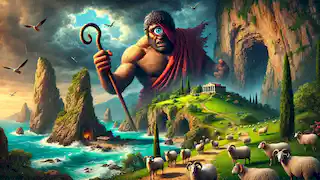The Story of the Cyclops
Reading Time: 7 min

About Story: The Story of the Cyclops is a Myth from greece set in the Ancient. This Dramatic tale explores themes of Courage and is suitable for All Ages. It offers Cultural insights. A gripping tale of wit versus might in the ancient Greek world.
Long ago, in the sun-drenched lands of ancient Greece, where the gods of Olympus ruled from their lofty heights and the seas shimmered with divine presence, tales of monstrous beings roamed the imagination of mortals. Chief among these terrifying creatures were the Cyclopes, a race of gigantic, one-eyed beings who were as feared for their immense strength as they were for their ferocious independence. Their existence teetered between myth and reality, as shepherds spoke of their looming shadows and sailors recounted tales of their island lairs.
At the heart of their legend lies the story of Polyphemus, the most famous of the Cyclopes, whose encounter with Odysseus, the crafty hero of the Trojan War, epitomized the clash between brute strength and human ingenuity. This story delves not only into the pivotal moments of their infamous encounter but also explores the deeper lore of the Cyclopes, their origins, and their enduring legacy in the annals of Greek mythology. Before the Olympian gods claimed their thrones on Mount Olympus, the world was a realm of chaos ruled by the primordial deities. Gaia, the Earth, and Uranus, the Sky, gave birth to many children, but none were as formidable or as misunderstood as the Cyclopes. Unlike their Titan siblings, the Cyclopes were monstrous in appearance. With a single, luminous eye at the center of their foreheads, they were often viewed as embodiments of raw, untamed power. The three primordial Cyclopes—Brontes, Steropes, and Arges—were not mere beasts. They were artisans of unparalleled skill. Deep within the fiery forges of the earth, they crafted weapons of divine potency. Zeus’ thunderbolts, capable of shattering mountains, were their handiwork. Hades’ Helm of Invisibility, a symbol of stealth and fear, emerged from their workshops. Even Poseidon’s trident, the instrument of his dominion over the seas, bore the mark of their craftsmanship. However, their destiny was marred by tragedy. Fearing their immense power, Uranus imprisoned them within Tartarus, a dark abyss far below the surface of the earth. Only during the great Titanomachy, the war between the Olympians and the Titans, were they freed by Zeus. In gratitude, they forged weapons for the gods, securing their place in the pantheon of mythology. Yet, despite their contributions, the Cyclopes remained shrouded in mystery, their monstrous appearance overshadowing their brilliance. Generations after the primordial Cyclopes, a new race emerged—more earthly and savage in nature. These Cyclopes shunned the company of gods and mortals alike, retreating to an isolated island. Here, they lived solitary lives, tending to flocks of sheep and goats, dwelling in dark caves that echoed with their thunderous roars. They were creatures of habit and instinct, uninterested in the affairs of the outside world. On this island, Polyphemus stood as the mightiest of his kind. Towering over his brethren, his frame was as formidable as the cliffs that bordered the island’s shores. Polyphemus was not a craftsman like his ancestors. Instead, he embodied the raw and untamed nature of the new Cyclopes. He was both shepherd and tyrant, his days spent guiding his flocks and his nights feasting in the solitude of his cave. Despite his isolation, Polyphemus was not without curiosity. He had heard whispers carried by the sea winds—stories of men who sailed vast oceans in pursuit of glory and riches. Yet he dismissed these tales, convinced that no mortal would dare set foot on his domain. He was wrong. Odysseus, king of Ithaca, had already faced countless trials on his journey home from the Trojan War. Driven by hunger and desperation, he and his crew landed on the Cyclopes’ island, unaware of the danger that awaited them. They were drawn to the island by the sight of lush pastures and the tantalizing aroma of roasting meat. As night fell, they stumbled upon Polyphemus’ cave. The cave was a treasure trove of provisions. Massive wheels of cheese, earthen jugs of milk, and herds of sheep and goats suggested a life of abundance. Odysseus’ men, driven by hunger, urged him to take what they needed and leave before the owner returned. But Odysseus, ever curious, insisted on staying. He wished to meet the Cyclops and see if he could win his favor. As the men feasted, a shadow fell over the entrance. Polyphemus had returned. His massive frame blocked the cave’s entrance, and with a thunderous roar, he demanded to know who had invaded his home. Polyphemus towered over the intruders, his single eye blazing with fury. "Who dares trespass in my home?" he bellowed, his voice shaking the walls of the cave. Odysseus stepped forward, trying to appeal to the Cyclops’ sense of hospitality—a sacred tradition in Greek culture. He introduced himself and his crew as humble travelers seeking shelter and offered gifts of wine in exchange for safe passage. But Polyphemus was no ordinary host. He scoffed at their words, declaring, "I am the son of Poseidon! I fear neither gods nor mortals." Without warning, he grabbed two of Odysseus’ men and devoured them in a horrifying display of brute strength. The remaining men were paralyzed with terror as Polyphemus settled down for the night, content in his dominance. Odysseus, though terrified, began to devise a plan. He knew that brute force would not save them. Polyphemus was too strong, and the boulder sealing the cave’s entrance was immovable. Only wit and cunning could ensure their survival. Odysseus offered Polyphemus more wine the next evening. The Cyclops, unaccustomed to alcohol, drank deeply and soon fell into a stupor. Before he lost consciousness, he asked Odysseus his name. The clever hero replied, "My name is Nobody." When Polyphemus finally succumbed to drunkenness, Odysseus and his men seized their chance. They heated a sharpened wooden stake in the fire until it glowed red-hot. Then, with all their might, they drove it into Polyphemus’ single eye. The Cyclops’ screams echoed across the island, a sound so terrifying it sent shivers down the spines of every living creature. As Polyphemus thrashed about, he called out to his fellow Cyclopes for help. But when they asked who was attacking him, he replied, "Nobody is hurting me!" Confused by his words, they left him to his torment. {{{_03}}} Though blinded, Polyphemus still posed a threat. He positioned himself at the cave’s entrance, determined to catch the men as they tried to escape. Odysseus, however, had one final trick. He tied his men beneath the bellies of Polyphemus’ sheep. As the animals passed by, the Cyclops felt only their woolly backs and let them through. When the last of his men was safe, Odysseus himself clung to the underside of the largest ram. As he passed Polyphemus, he could feel the Cyclops’ hand graze the wool above him, but the trick held. They escaped to their ship, carrying with them both relief and the scars of their ordeal. As the ship sailed away, Odysseus, unable to resist, shouted back at Polyphemus, revealing his true identity. "Tell them it was Odysseus of Ithaca who blinded you!" he cried. Enraged, Polyphemus hurled massive boulders into the sea, narrowly missing the retreating ship. Worse, he called upon his father, Poseidon, to curse Odysseus, ensuring that his journey home would be long and perilous. {{{_04}}} Polyphemus’ story did not end with his blinding. He became a symbol of the Cyclopes’ duality—beings of immense power and vulnerability. In later myths, he was depicted as a tragic figure, mourning the loss of his sight and cursing the gods who had forsaken him. For Odysseus, the encounter with Polyphemus marked a turning point in his journey. It demonstrated the limits of human arrogance and the dangers of underestimating divine wrath. The curse of Poseidon would haunt him, leading to years of suffering and loss before he finally reached Ithaca. The tale of Polyphemus and Odysseus remains one of the most enduring myths of ancient Greece. It speaks to the tension between brute strength and cleverness, the struggle between man and monster, and the delicate balance between pride and humility.The Primordial Cyclopes
The Island of the Cyclopes

The Arrival of Odysseus
Polyphemus' Wrath

The Blinding of Polyphemus
The Escape
The Legacy of Polyphemus

















